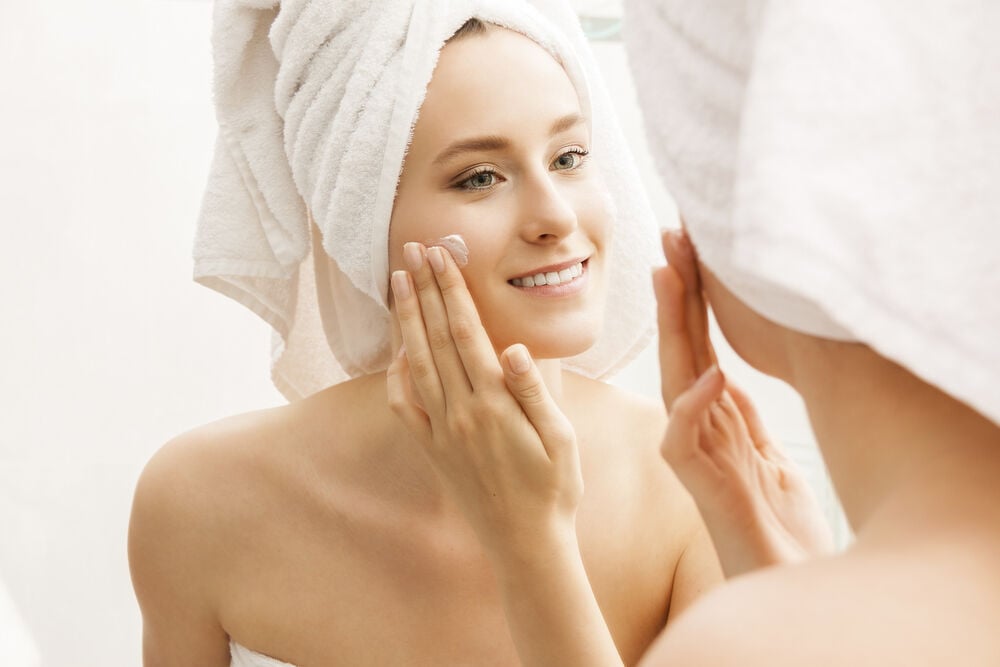Your menstrual cycle has a lot to do with the appearance of your skin. We broke down the average menstrual cycle by phases to give a better understanding of how these hormone surges affect our skin and how to switch up your skin routine to make sure you’re nourishing your skin effectively.
-
Tracking cycle
-
Getting pregnant
-
Pregnancy
-
Help Center
-
Flo for Partners
-
Anonymous Mode
-
Flo app reviews
-
Flo Premium New
-
Secret Chats New
-
Symptom Checker New
-
Your cycle
-
Health 360°
-
Getting pregnant
-
Pregnancy
-
Being a mom
-
LGBTQ+
-
Quizzes
-
Ovulation calculator
-
hCG calculator
-
Pregnancy test calculator
-
Menstrual cycle calculator
-
Period calculator
-
Implantation calculator
-
Pregnancy weeks to months calculator
-
Pregnancy due date calculator
-
IVF and FET due date calculator
-
Due date calculator by ultrasound
-
Medical Affairs
-
Science & Research
-
Pass It On Project New
-
Privacy Portal
-
Press Center
-
Flo Accuracy
-
Careers
-
Contact Us
Spots, Dry, and Oily Skin: How Hormones Affect Your Skin Before and During a Period


Every piece of content at Flo Health adheres to the highest editorial standards for language, style, and medical accuracy. To learn what we do to deliver the best health and lifestyle insights to you, check out our content review principles.
Hormones that affect the skin
During most people’s menstrual cycles, the skin experiences different times of dryness and oiliness. The skin can become the most problematic during your period and a couple of days prior to it, which is when you can expect period-related pimples and acne. All this results from the buildup of sebum underneath the surface, causing the appearance of oily skin. You could try predicting when breakouts are more likely to happen by keeping a log of your cycles with a period tracking app like Flo.
If you’ve ever wondered what hormone causes oily skin, the answer actually involves the effects of multiple hormones. Imbalances in certain hormones — like progesterone, estrogen, and testosterone — affect your body’s natural oiliness and the appearance of dry skin.
Estrogen reaches a high point and a low point during the menstrual cycle. It causes changes in the skin by influencing its texture and thickness, as well as structural integrity and fluid balance. Changes in hormonal levels can cause acne, and progesterone plays a big role in this process. Progesterone causes breakouts by closing skin pores and inducing sebum buildup underneath the surface of the skin.
Your skin during menstruation
During the first days of your cycle, levels of hormones such as estrogen and progesterone are low. This causes dry, dull skin and can make lines or wrinkles appear more obvious. Moisturizing and hydration can be great skin boosters during the initial days of your cycle. Hygiene during your period will also help protect your skin from bacteria and possible skin infections.
What happens to your skin
During the first week of the menstrual cycle, estrogen is low. Aside from regular cleaning and moisturizing, your skin should require little maintenance and be in good shape overall.
If skin issues during your period are concerning to you, consult a dermatologist. They can help identify any underlying issues related to hormonal levels that may need investigation. A dermatologist may also suggest testing if they suspect that the problem extends beyond the skin. If you’re interested, they can provide a personalized list of skin care items and ingredients to look for when buying skin care products.
Skin care tips
If you struggle with hormonal skin issues, your best bet is to work with a dermatologist or a skin care specialist. They will help you find the right routine and products for healthy, glowing skin. Here are some of the top tips for keeping your skin healthy at tricky times in your menstrual cycle:
- Clean your face twice a day. Even if you don’t use facial cleansers multiple times a day, consider trying it during your period. The hormone changes during your cycle can make the sebaceous glands go crazy. Sebaceous glands produce sebum — a natural oil. As your skin gets oilier, it may need extra help to remove excess sebum. This can keep pimples and menstrual acne from forming.
- Use medication and supplements. A wide range of conditions and illnesses are influenced by the menstrual cycle. These conditions also cause serious skin issues like cystic acne and scarring. A health care provider can prescribe different kinds of medications to address these concerns. You could receive hormonal therapy or take certain supplements to ease menstrual bloating, abdominal pain during periods, and skin issues. Natural remedies are fine as long as you are not using them instead of prescribed treatment.
- Cutting sugars and carbs from your diet will help prevent breakouts.
- Find the products that work best for you. For some people, cleansing wipes are a helpful shortcut. Others swear by a quick dab with blotting paper. Most folks experience good results from moisturizers and other products that nourish the skin, remove extra oils, and keep pores clear.
- Get facial treatments. A cosmetician can offer guidance for menstrual cycle-related skin issues and recommend treatments, masks, massages, or other remedies.
Take a quiz
Find out what you can do with our Health Assistant

Follicular phase
During the follicular phase, which is the first 10 to 16 days of your menstrual cycle, estrogen levels slowly rise. Your skin will likely be on its best behavior, and irritation is less common. You might feel an emotional uplift because of increasing serotonin levels.
What happens to your skin
As estrogen levels rise, you may notice a glow by the ninth day of the menstrual cycle. Between the tenth and thirteenth day of the menstrual cycle, estrogen will peak.
This is also when testosterone levels will begin to rise. Your skin experiences more natural moisture and collagen production, which will make your skin stronger and more elastic.
Skin care tips
Your skin may be at its best during the follicular phase. This means your routine of cleansing and using a light moisturizer should meet your skin’s needs just fine.
Ovulation
Around day 14 of your cycle, ovulation often happens. Your skin will likely appear clear and bright over the next five days until testosterone and estrogen begin to decrease.
At that time, your progesterone levels will start to rise, which will lead to oilier skin. Estrogen, which peaks during ovulation, often gives the skin a healthy glow.
What happens to your skin
Increased luteinizing hormone levels can make your skin prone to bacterial overgrowth. To avoid transferring bacteria to your face, avoid going to bed with makeup on during the ovulation period and pay extra attention to handwashing hygiene. This could contribute to acne.
Skin care tips
- Use oil-free skin care.
- Choose light, water-based products like face mists, sprays, light tonics, and micellar water (make sure to wash it off your skin after).
- Avoid products that clog the pores (look for products marked "non-comedogenic").
Luteal phase
Premenstrual symptoms, aside from prompting cravings for unhealthy food and an irritable mood, can also cause skin changes. Some people don't find these hormone fluctuations during the cycle uncomfortable, while others have to adjust their schedule and routines around their menstrual cycles.
All of these drastic changes are due to hormonal imbalances that take place before, during, and a few days after a period.
What happens to your skin
Keep your skin care light during the premenstrual interval and your periods. Focus on hydration and avoid layering different products, especially if they are oil-based.
Before and during a period, you might experience increased oiliness of the skin, as well as bloating and swelling throughout your body. This is due to water retention. Keep yourself hydrated and enrich your meals with vegetables and fiber-rich foods to add vitamins to your diet.
Skin care tips
The luteal phase begins in the second half of your cycle, once ovulation starts. Here are some skin care tips for the luteal phase:
- Avoid processed and salty foods or snacks, as these will cause more bloating, make your skin feel drier, and worsen breakouts. Also, avoid touching your face and resist picking blackheads, whiteheads, acne, or any other skin irritation that occurs.
- Premenstrual symptoms can include nervousness, increased appetite, bloating, and breakouts, particularly on the chin and around your nose. During this time, it’s helpful to avoid heavy makeup.
- Pay particular attention to cleansing the skin.
- Focus on skin care products made to treat acne.
- Try to minimize sugar and caffeine.
- Avoid using makeup whenever possible.
- If you do use makeup, go for a lighter, natural look and especially avoid using heavy foundations. Try not to layer multiple products such as highlighters, creams, and setting powders on the skin.

Summing up
Your menstrual cycle influences your overall mood, energy levels, and the condition of your hair and skin. Feeling sick during periods isn’t uncommon. As your body prepares for possible conception throughout the month leading up to menstruation, your entire body is adjusting its hormone levels to produce a new egg.
Because of these physical and physiological changes, your skin can become either drier or oilier. These changes are triggered by fluctuating levels of estrogen, progesterone, and testosterone. Learning to adjust your diet and skin care routines can keep your skin in great condition, despite intense hormonal changes.


Hey, I'm Anique
I started using Flo app to track my period and ovulation because we wanted to have a baby.


The Flo app helped me learn about my body and spot ovulation signs during our conception journey.


I vividly
remember the day
that we switched
Flo into
Pregnancy Mode — it was
such a special
moment.
Real stories, real results
Learn how the Flo app became an amazing cheerleader for us on our conception journey.




